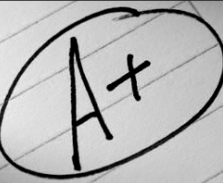By Erica Gustafson, Opinion Editor
Since a child enters school, percentage and letter grades are some of the biggest stressors in education. Students are constantly pushing themselves to the limit to get grades that are deemed as “acceptable” in the public eye. It is one of the biggest common associations that people make when thinking of school. They hear school and think of grades.
There is one question that constantly arises from this. Do these letter grades really determine what students learn in the classroom? Depending on how a person views this question, several answers can be explained. However, a specific course grade does not show that a student has retained information from each lesson.
Dr. Asiyath Mohamed Didi is the principal of Hithadhoo School in the Maldives, according to a 2020 article in Corporate Maldives. She focuses her career on personal and professional development, teaching, learning and leadership.
Her article “Your Grades Do Not Determine Success; Your Character Does” really expresses the concept that grades are not the only factor that can accurately predict future success away from the classroom.
Didi writes that “Grades are mere reflections of what or how much the person has learned during their school days, that does not even determine the academic abilities of someone.”
Most students rely on their memory to achieve a good grade on an exam or quiz. What amount of class information do students actually remember and learn?
Since there needs to be some rating system to calculate whether a student is ready to move on in education, grading should not be completely erased. However, grading tends to build a barrier between students and their teachers.
One St. Bonaventure University professor is taking this into account while planning for her course.
Adrienne Foos, an assistant professor of marketing for the School of Business, teaches a consumer behavior class where she has implemented the concept of ungrading.
In her first PowerPoint to her class, Foos wrote that “ungrading simply means there are no grades in this course, other than the required midterm and final grade. Ungrading means we will focus less on grades and more on learning. Ungrading is a sound, proven, pedagogical approach that has been researched and used for decades.”
Students participating in her course work through a number of assignments and only receive feedback. Foos only discusses grades when she reviews overall semester work at midterms and final exam week to discuss with her students what grade they each believe they should receive.
Foos implemented extra learning opportunities into her course foundation. Students can pick and choose which additional projects they would like to work on and submit to her. She then gives them feedback and allows them to work on them and improve.
Each student can form an individualized learning experience in which they can personalize their coursework. They can focus on things that they find interesting.
Ungrading allows for students to be intrinsically motivated to grow in response to the feedback that they receive. It can decrease test anxiety and builds on students’ freedom of creativity.
Foos’ ungrading system requires students to complete work and allows them to focus on the information itself. There are no pressures to pass exams or complete homework perfectly.
Grades may be beneficial in showing which students are ready to move on academically. However, they do not always show what a student has learned in the multiple hours they are in a classroom.
gustafea18@bonaventure.edu









